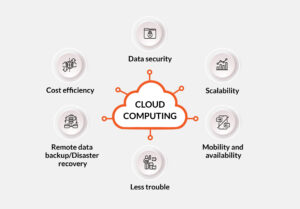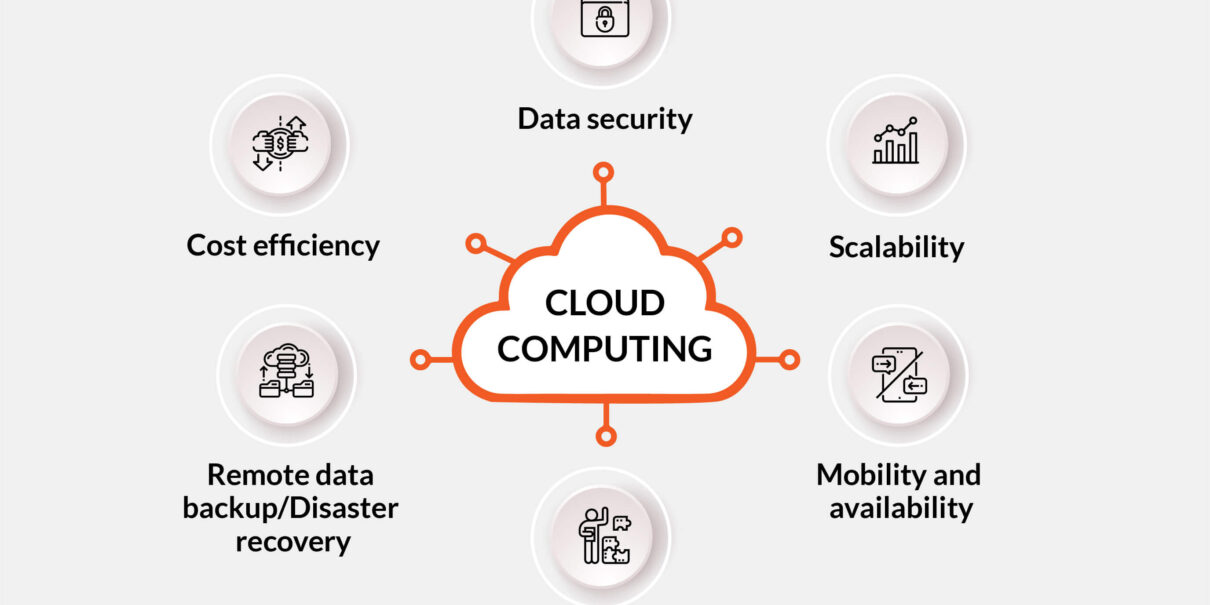Cloud Computing: Efficient Data And Information Management

Cloud computing is a technology that has transformed the way businesses and individuals access, store, and process data. It allows users to access computing resources, such as storage and processing power, over the internet instead of having to store everything locally on their own devices. In this blog, we will explore what cloud computing is, its benefits, and how it is changing the way we work.
What is cloud computing?
Cloud computing refers to the delivery of computing services such as servers, storage, databases, and applications over the internet. Instead of having to store data and run applications on a local computer, cloud computing allows users to access these resources remotely through the internet. This means that users can access their data and applications from any location, as long as they have an internet connection.
Benefits of cloud computing
Cost-effective: Cloud computing eliminates the need to invest in expensive hardware and software, as well as the maintenance costs associated with them. Instead, users pay only for the resources they use, making it a more cost-effective solution.
Scalability: With cloud computing, businesses can easily scale up or down their computing resources as needed, without having to invest in additional hardware. This means that businesses can respond quickly to changing demand, without having to worry about the costs associated with purchasing and maintaining new hardware.
Flexibility: Cloud computing allows users to access their data and applications from any location, making it possible for businesses to allow remote work and collaboration.
Accessibility: Cloud computing services can be accessed from anywhere with an internet connection, allowing businesses to work remotely and access their data and applications from anywhere.
Reliability: Cloud computing providers have robust infrastructure, with multiple servers and data centers to ensure high availability and data protection.
Security: Cloud computing providers invest heavily in security measures to protect their customers’ data, which can be more secure than traditional IT systems, especially for small and medium-sized businesses that might not have the resources to implement similar measures themselves.
Innovation: Cloud computing enables businesses to experiment with new technologies, applications, and services that would otherwise be too expensive or complex to implement in-house.
Collaboration: Cloud computing makes it easier for teams to collaborate and share information and resources, leading to increased productivity and innovation.
The future of cloud computing
Cloud computing is rapidly changing the way we work and store data, and its impact will only continue to grow in the future. As more businesses and individuals adopt cloud computing, it will become even more cost-effective and accessible, making it an essential technology for business
Here are some popular examples of cloud computing tools:
Infrastructure as a Service (IaaS): Amazon Web Services (AWS), Microsoft Azure, Google Cloud Platform (GCP)
Platform as a Service (PaaS): Heroku, AWS Elastic Beanstalk, Google App Engine
Software as a Service (SaaS): Salesforce, G Suite (formerly Google Apps), Microsoft 365
Storage as a Service: Amazon S3, Microsoft OneDrive, Google Cloud Storage
Database as a Service: Amazon RDS, Microsoft Azure SQL Database, Google Cloud SQL
Backup and Recovery as a Service: AWS Backup, Microsoft Azure Backup, Google Cloud Backup and Recovery
Security as a Service: AWS Security Hub, Microsoft Azure Security Center, Google Cloud Security Command Center
Artificial Intelligence as a Service (AIaaS): AWS SageMaker, Microsoft Azure Machine Learning, Google Cloud AI Platform
Serverless Computing: AWS Lambda, Microsoft Azure Functions, Google Cloud Functions
These are just a few examples, and new tools and services are being introduced all the time in the fast-paced world of cloud computing.
In conclusion, cloud computing is a game-changing technology that offers a range of benefits, including cost-effectiveness, scalability, flexibility, reliability, and security. As the world becomes increasingly digital, cloud computing will play an even more important role in the way we work and store data.
Subscribe below to receive business related emails.
subscribe below to receive business/consumer related emails from sumbor.






